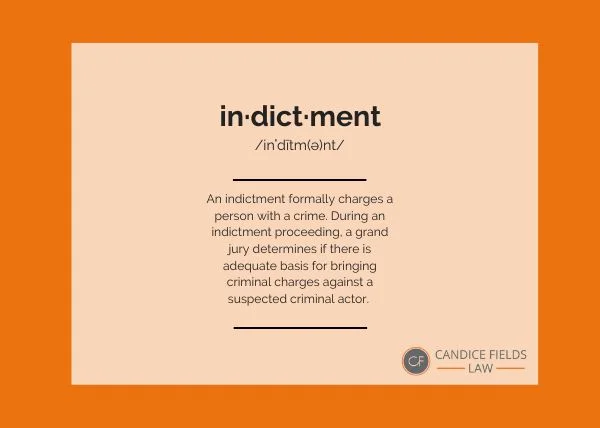In the legal realm, terminology can often become complex and confusing. Terms like indictment, superseding indictment, criminal complaint, and information are essential in the criminal justice system, yet their meanings and implications can be difficult to differentiate. This blog post will distinguish between these terms, highlighting their significance and roles in legal proceedings.
An indictment is a formal accusation that initiates a criminal case, based upon evidence a prosecutor presents to a grand jury, and outlines specific charges against a defendant. The grand jury is an impartial group of citizens who determine whether there is sufficient cause to charge a person with a crime. If so, the indictment is issued, and the criminal case proceeds to trial unless it is dismissed or a plea agreement is reached.
Key Points:
A superseding indictment replaces an original indictment, often introduced to add new charges or additional defendants or to refine the allegations after further investigation. It essentially “supersedes” or replaces the previous charges, offering an updated version of the accusations.
Key Points:
An information is a formal criminal charge that does not require a grand jury’s vote. It outlines the specific charges against the defendant, like an indictment, but is submitted by the prosecutor to a judge who decides whether there is probable cause that a crime occurred. It’s typically used in cases where the defendant has waived their right to a grand jury review, often as part of a plea agreement.
Key Points:
A criminal complaint is a document filed by the prosecutor in conjunction with the law enforcement agency that investigated a case (FBI, IRS, OIG, etc.) stating the essential facts constituting the offense charged against the defendant. This document serves as the basis for an arrest warrant if the court finds probable cause.
Key Points:
Being confronted with an indictment, superseding indictment, information, or criminal complaint can be an intimidating experience. At Candice Fields Law, PC, we understand the intricacies of these legal challenges. We are dedicated to standing beside you, providing the strategic support and experience necessary to navigate these intricate situations.
Here’s how we can be your steadfast ally.
When facing an indictment, we’re committed to:
In the event of a superseding indictment, our focus is on:
In cases involving an information, we provide:
When confronted with a criminal complaint, our approach includes:
Navigating the complexities of legal terms and proceedings can be daunting. Empower your defense with experience, personalized strategies, and unwavering advocacy. At Candice Fields Law, PC, your peace of mind and legal standing are our utmost priority.

An indictment is a formal charge or accusation of a serious crime issued by a grand jury that presents specific allegations and evidence against a defendant in a criminal case.
A grand jury, consisting of a group of citizens, reviews the evidence presented by the prosecutor. They issue an indictment if they believe there’s enough evidence to charge the individual.
No, an indictment is a charge, not a conviction. It initiates a criminal case where the defendant can plead guilty or not guilty, leading to a trial, plea agreement, or dismissal to determine the outcome.
Post-indictment, the defendant is usually arrested if they are not already in custody. They are then arraigned, where they can plead guilty or not guilty. The case may proceed to trial if a dismissal is not obtained, or a plea agreement isn’t reached.
Yes, a prosecutor can amend charges by issuing a superseding indictment, adding, modifying, or dropping charges based on new evidence or legal strategies.
Retaining a skilled criminal defense attorney is crucial. They can review the evidence, challenge its validity, negotiate plea deals, or prepare a defense for trial to seek a favorable outcome.
A grand jury evaluates the prosecutor's evidence and witnesses to decide if there’s probable cause to believe the defendant committed a crime. If so, they issue an indictment.
Yes, indictments can sometimes be dismissed due to insufficient evidence, procedural errors, or legal issues. A defense attorney can file pre-trial motions to seek dismissal or reduction of charges.
__________________________________________________________________________
The superseding indictment replaces the original indictment entirely. While it can retain original charges, it can also modify, add, or remove them based on evolving evidence and legal considerations.
Absolutely. Just like the initial indictment, defense attorneys can challenge a superseding indictment on various grounds, including legal errors, insufficient evidence, or procedural missteps.
It can extend the case timeline, as it often necessitates additional proceedings, evidence reviews, and legal considerations to address the updated or additional charges.
Defense attorneys may need to adapt their strategies to counter new or modified charges, gather additional evidence, and address new legal considerations presented in the superseding indictment.
Yes, plea negotiations can continue, and agreements can still be reached after a superseding indictment. The terms might be revised to reflect the updated charges.
Since the filing of an information usually occurs after negotiations have occurred between the prosecution and the defense, arrangements can often be made to have the defendant make their initial appearance without the need for an arrest. Once they are arraigned, a defendant often is already prepared to plead guilty and a plea agreement has already been negotiated.
Yes, often, an information follows early plea negotiations, where the defense and prosecution may agree to resolve the case with reduced charges or penalties without proceeding to trial.
Although unusual, a defendant can challenge the charges outlined in an information, and a defense attorney can file pretrial motions to dismiss or reduce the charges based on legal or factual issues.
Yes, similar to an indictment, a defendant charged by information can still plead not guilty, leading to a criminal trial where the prosecutor must prove their case beyond a reasonable doubt.
If under federal investigation, seeking immediate legal counsel is paramount. An experienced criminal defense attorney can enter into early negotiations with the prosecutor which may result in the best outcome possible including, if required, charges filed through an information with an agreed-upon resolution.
The court reviews the complaint. The court may issue an arrest warrant if there’s probable cause to believe a crime has been committed. The defendant will then be arrested, and the case begins.
If insufficient evidence, procedural errors, or legal grounds exist, the complaint can be challenged and possibly dismissed before trial.
Generally, yes. Criminal complaints are public records, accessible to anyone seeking information about the case unless sealed for specific reasons like privacy concerns or ongoing investigations.
Securing experienced legal representation is crucial. A defense attorney can evaluate the evidence, challenge its validity, and develop a strategy to counter the allegations, aiming for dismissal, reducing charges, or a favorable trial outcome.
Indeed, many criminal cases initiated by complaints are resolved through plea bargains, where the defense and prosecution agree to resolve the case without going to trial, often leading to reduced charges or penalties.


